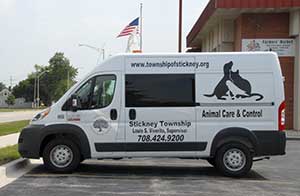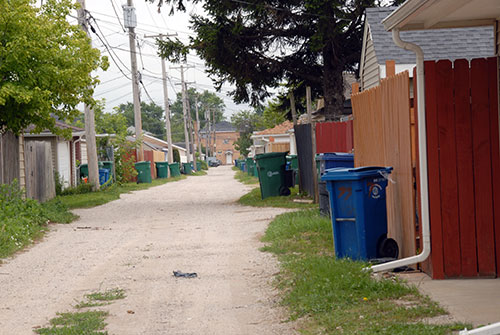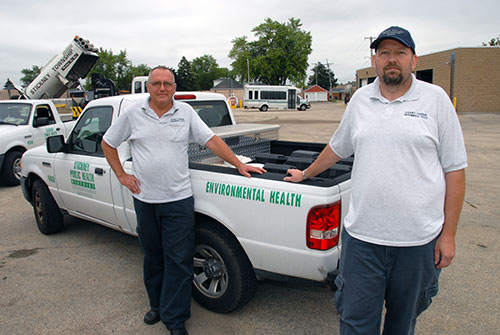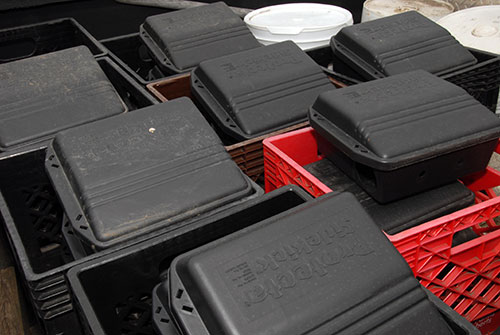


Concerns about stray animals can be directed to the Animal Warden at 708-424-9200 x 2187
Emergency Number:708-927-2943

In Stickney Township, Field Technicians Joe Schultz and Jim Morrison are the front line response to reports of rat activity in Stickney Township. Joe and Jim have been fighting rats in Stickney Township for the past 8 and 3 years respectively and have come to know a lot about their enemy. Both are certified by the Illinois Department of Agriculture to handle pesticides related to both mosquitos and rodents.
When the pair follow-up on complaints, they meet with residents to provide information regarding what prevention options the resident may have, what the Township can do, and a timeline for what happens next. They examine property looking for evidence of a rat presence and if found, they determine if placing poison bait is appropriate.
“If we’re responding to a complaint where a bait box is appropriate we let the homeowner know that we plan to place the box containing a poison on their property and obtain their permission,” explains Joe, adding that apartment buildings are technically the responsibility of the landlord.
Jim explains that for the team from Environmental Health to take action on a complaint there must be evidence of an infestation on the property. “Seeing one run by, people often think that they have a major infestation. We have to focus on where they are coming from.”
The best defense is a good offense and, according to Joe, the first thing a resident can do is to eliminate sources of food and water for rats.
Jim agrees, “the best thing to do is to keep up your yard. If you have a dog, pick up after the dog as soon as you can. If the garbage cans have holes, get them replaced. Avoid feeding birds and wildlife. Keep firewood 18 inches off the ground. Rats like concealment. You’ll find burrows under firewood stacks, low-lying evergreens, shrubs, and bushes. They like to hide anywhere that’s dark.”
“Garbage cans are often an issue. They can have holes in the bottom where rats have chewed through,” adds Joe.
A new garbage can may have a cost associated with it that deters some homeowners from replacing ones that have suffered rat damage. Although Jim sympathizes, he tells homeowners “it's the can or the rats.”
Joe suggests that one option is getting a metal can to store garbage in and to transfer it to the plastic cans on trash pick-up days.
“We’re in a proactive position when it comes to these rodents. We put poison bait out for them and check for activity, but these are creatures of habit,” explains Joe, “they need food and water to live. Once they find it they’ll keep coming back to the same location and may ignore our boxes. If the sources are removed, we stand a better chance of them taking the bait.”
Jim says that “once they find a food source like a bird feeder, they’ll go there everyday and actually form a trail through the grass. The grass is often discolored from urine and the oils on their fur. We often see this in a bad infestation.”
Once the bait boxes are strategically placed, the crew returns regularly to check them.
Jim says that Stickney Township is different than some municipalities that just drop poison. “We follow through. We don’t just drop the box. We follow up to see if there is any activity. We come back and may move the box around until we get a hit. It’s like fishing.”
“A lot of people think that once the bait box is in place it’s the answer to their rat problem. In some cases it is,” however Jim notes that “even doing this may not completely eliminate the rat population if your next door neighbors are providing them with food and shelter.”
“If you look over (at a neighbor’s yard) and they’ve got tall grass and blight, that’s where the rats are” and you still have a problem.
“Too often,” Jim continues, “it’s the poor guy caught in the middle. On one side they have a neighbor feeding the birds, on the other side the neighbor isn’t picking up after their dog, and the rats live under the deck of the property in the middle. Rats are creatures of habit. They’re going to go back to the same food source over and over again until it’s eliminated.”
Reporting issues is important.
If blight is an issue in your neighborhood, Joe suggests calling your local city services. “In Burbank they can call the public works blight department to report incidents of problematic properties.”
Properties that have overflowing dumpsters or cans are of special concern. Residents who try to avoid paying for garbage pick-up often resort to “fly-dumping” of their trash in other people’s garbage cans, dumpsters, or open areas. This contributes to feeding vermin.
In discussing residential rat problems, Jim confirms that due to the COVID shut down rats had to find new sources of food. “When the restaurants shut down there weren’t as many food scraps in the trash. Rats started to rely more heavily on residential sources.”
Jim cautions homeowners that when a bait box is in place they should avoid moving it without first making sure that there aren’t any rats inside. He carries a pipe with him as he checks the boxes and taps each one before checking to see if the bait has been taken.
“I had one come out of one once and stare up at me like I was disturbing his meal. After checking the box and putting it back in place I walked away. Out of the corner of my eye I see him scurry right back in to finish his last meal.”
Jim says that “people often want us to drop a box at the bottom of their bird feeder, but that’s really not going to do much good.”
Joe agrees, “they’re such creatures of habit that once they have a food source they’ll go right past it.”
Once you cut off that food source, and they realize that they aren’t getting that free dinner anymore, then you can be proactive and drop a box down.”
Jim warns dog owners not to leave water bowls out and, if they have a baited box or not, to check their yards before letting their dogs out.
“Rats spread disease. They’ll get into a water bowl and contaminate it. If a dog comes across a dead rat they may try to grab it and contract disease that way. It’s important for dog owners to check their yard regularly for dead animals.”

Field Technicians Joe Schultz and Jim Morrison travel the Township inspecting bait boxes in an effort to control the rat population.
Bait boxes loaded and ready to be placed.

Trash cans that rats have gnawed their way through should be replaced.
